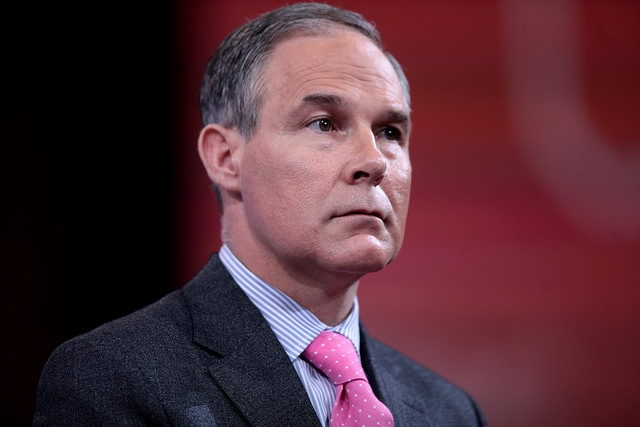You, the American taxpayer, spent over $3.5 million providing U.S. Environmental Protection Agency (EPA) administrator Scott Pruitt with an unprecedented round-the-clock security detail — and that security force may have been operating both outside of the law and without justification.
That’s the message the EPA’s internal watchdog has for American taxpayers after concluding an audit of the environmental agency’s security protocols from September 2016 to May 2018.
Over just 11 months in 2017, Pruitt racked up millions — on the taxpayers’ dime — on his own personal security, more than double the amount spent on security by previous administrators.
And Pruitt’s security detail, unlike previous teams, didn’t use U.S. Marshalls, who are the ones authorized by the Government Accountability Office to carry firearms and make arrests, the audit found. EPA stopped using those U.S. Marshalls in 2017. Instead, it used EPA agents who only have clear authority from Congress to fight the nation’s environmental crimes. Those crimes can include illegally dumping hazardous waste or keeping dangerous toxic accidents concealed from the public.
Instead of focusing on that important job, EPA agents were assigned to provide 24/7 security to the EPA administrator — but those agents lacked clear legal authority from Congress, meaning they may have been operating outside of the limits of federal law. Asked repeatedly to provide the legal basis for using those agents to keep Pruitt under constant federal protection, the audit concluded that Pruitt’s EPA failed to answer for over a year.
“EPA law enforcement authority … is limited to investigation of criminal violations of laws administered by the EPA,” the EPA Office of the Inspector General audit concluded. “By contrast, the Secret Service statute states, in part, that the service is authorized to protect the President, his family, former Presidents, presidential candidates and other distinguished foreign visitors, to name a few. No similar language exists in the comparable EPA statute.”
Worse, Pruitt’s EPA spent that $3.5 million “without documented justification,” the audit found, adding that the agency “did not conduct a threat analysis … to determine the increased level of protection necessary or desired for Administrator Pruitt.”
The EPA provided investigators with a report showing “statistical data” and the details surrounding some threats but “did not assess the potential danger presented by any of these threats.” The information provided “should not have been used to justify protective services,” the audit added. Furthermore, that report was prepared nearly six months after the ramped-up security detail started providing round-the-clock protection.
The audit does not cover some of the more attention-getting security expenses incurred by Pruitt’s EPA — his requests for a bullet-proof SUV, the sound-proof telephone booth, or other tactical gear that dominated headlines during Pruitt’s tenure. It instead focuses on the staffing of Pruitt’s security team, called the Protective Service Detail. Previous EPA administrators used that security detail during travel, but Pruitt had 24/7 protection from a staff of 19 agents, up from a staff of six, according to the audit.
“The Inspector General’s report today confirms what we already know: there was no serious evaluation of the so-called ‘threats’ to former Administrator Scott Pruitt’s personal safety, and no reason to justify providing him with round the clock security and first class travel,” said Eric Schaeffer, Executive Director of the Environmental Integrity Project and former director of civil enforcement at EPA. “Nothing more than paranoia and mismanagement explains why taxpayers shelled out more than $3.5 million last year — more than twice the amount spent in previous Administrations — on Mr. Pruitt’s personal bodyguard.”
The audit was initially launched before Trump or Pruitt took office, EPA auditors said in a recorded interview published on their website, in response to a hotline tip that some members of the EPA’s Protective Service Detail were getting premium pay for hours that should have been at normal rates, potentially by taking home overtime pay that wasn’t authorized. The audit found that unauthorized overtime added up to $106,507 between January 2016 and March 2017 — a sliver of the $3.5 million in other problems auditors documented.
They recommended steps to ensure that threats were properly assessed in the future, recommending routine threat assessments like those conducted by other agencies and establishing policies to prevent abuses in the future.
But, the auditors added, the EPA has not yet taken many of the steps they recommended.
“The agency took or agreed to take sufficient corrective actions for four of our 12 recommendations,” the audit found, “but the remaining eight remain unresolved.”
Main image: Oklahoma Attorney General and later EPA Administrator Scott Pruitt in 2015. Credit: Gage Skidmore, CC BY–SA 2.0
Subscribe to our newsletter
Stay up to date with DeSmog news and alerts







